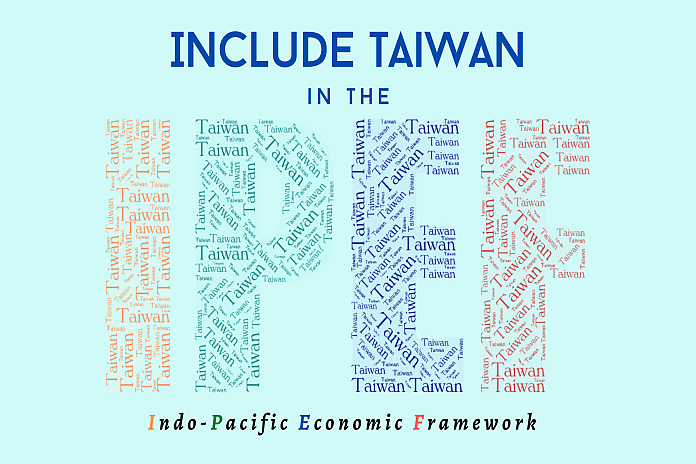By Caribbean News Global ![]()
TORONTO, Canada – The framework presented for the Indo-Pacific Economic Framework (IPEF), the supply chain, infrastructure decarbonisation, trade, inclusive of the digital economy, trade facilitation, labor and environmental standards, tax and anti-corruption pillar bring the Biden administration global policy priority into an Indo-Pacific context in sharp focus with Taiwan’s global modernism and a new architecture for the region.
Similarly, the objectives of a connected economy, resilient economy, clean economy, and fair economy also signify Taiwan’s global priorities in negotiating with partners, allies, and the continuation of global economic norms.
The future of each of our nations – and indeed the world –depends on a free and open Indo-Pacific enduring and flourishing in the decades ahead. ~ President Joe Biden, Quad leaders Summit September 24, 2021.
The 19-page strategy framework and objectives – taking into account current world challenges and Taiwan’s status in the international community, is now more obvious why the US should #Let Taiwan join IPEF.
The downside risks are all too obvious – to promote and protect Taiwan – and the rules of international order.
The IPEF should not attempt to sideline Taiwan, given the long-term transformative effects of the Indo-Pacific, state-led economic power and political intercourse that seek to define the global order.
The current focus on Taiwan requires a more robust economic commitment to abroad-based economic growth and global security that require bold initiatives. This is critical to the geopolitical mainstay of the Indo-Pacific.
The IPEF should include Taiwan and embrace an inclusive economic agenda – promoting shared interests – for its overall success.
Taiwan is an Asian economic and technological power and as such, it is inconceivable that Taiwan may be excluded from IPEF. And considering Taiwan’s ongoing contribution to most pillars of interest under the IPEF framework: 1) digital and emerging technologies; 2) supply chain resilience; 3) infrastructure; 4) clean energy, 5) decarbonization; 7) tax; and 8) anti-corruption.
Taiwan’s participation in IPEF and the emerging economic order is vital in shaping the new architecture of things – a robust Asian economic and technological power in the 21st century. Taiwan’s inclusion in IPEF should be viewed as a natural evolution to confront ambitious and challenging [un]certainly, in a region particularly vulnerable to China’s coercion.
Global trends and regional economic integration through initiatives and agreements have solidified Taiwan’s global positioning. IPEF should not regress but integrate policy promoting existing relationships, agreements and commitment with Taiwan.
Taiwan’s participation in IPEF should be pursued as a guiding force to solidify a new architecture for the Indo-Pacific, the global order, inclusive of a multilateral economic engagement and initiatives among Indo-Pacific economies. IPEF is a novel and strategic opportunity for the economic order. And the US, should not miss this opportunity – in comparison to the 1990s Soviet Union era, and the UK – US attempted trade agreement in 1938.
In 1979, the Senate passed a very important bill called the Taiwan Relations Act–a very bipartisan bill. From that time on, the Senate has played a very important oversight role in US relations with Taiwan, and it has always been very bipartisan, recalls Sen. Dan Sullivan, delivering a speech – Indo – Pacific economic framework.
“No. 1, and the real purpose of what I wanted to talk about, right now, we are hearing from administration officials that the Indo-Pacific economic framework is going to exclude Taiwan. Whoa. Whoa. That would not be a good thing, and I don’t think many US Senators–Democrats or Republicans–would agree that the Biden administration’s first big economic initiative is going to exclude Taiwan, a very important economic player, very important technical player in terms of chip fabrication. Why would they do that? Well, it is not clear.
“I have been pressing a number of Biden administration officials saying, you can’t make that move. A: The Senate is not going to like it. And we have had a lot to say about US relations with Taiwan for decades. And, B: It just doesn’t make sense,” said Sen. Dan Sullivan.
While some in Congress agreed that it is a mistake to exclude Taiwan from IPEF, the prospect of more noise and a false flag is counterproductive to the significance of the Comprehensive and Progressive Agreement for Trans-Pacific Partnership (CPTPP), the Regional and Comprehensive Economic Partnership (RCEP) or the World Trade Organisation (WTO).
Taiwan is a major force of global significance. President Tsai Ing-wen (蔡英文) in December last year emphasized Taiwan’s willingness to participate in the IPEF, while minister without portfolio John Deng (鄧振中) has expressed Taiwan’s desire to join the framework.
The misguided thought process of Taiwan’s exclusion from IPEF is indistinguishable from reason on matters of a connected, resilient, clean and fair economy. While other arguments are eccentric.
To be clear: Taiwan has already passed the challenges in practical terms relevant to IPEF models. However, the onus to enter and participate in reforming the multilateral, economic and trade systems continues.
“Taiwan’s advantages in the high-tech industry – competence in dealing with corruption, forging a digital economy and commitment to zero-carbon policies – could contribute to the IPEF’s success and benefit regional countries,” noted Huynh Tam Sang.
To exclude Taiwan from IPEF is a mistake – vis-à-vis – “flexible and inclusive [ness]!”





